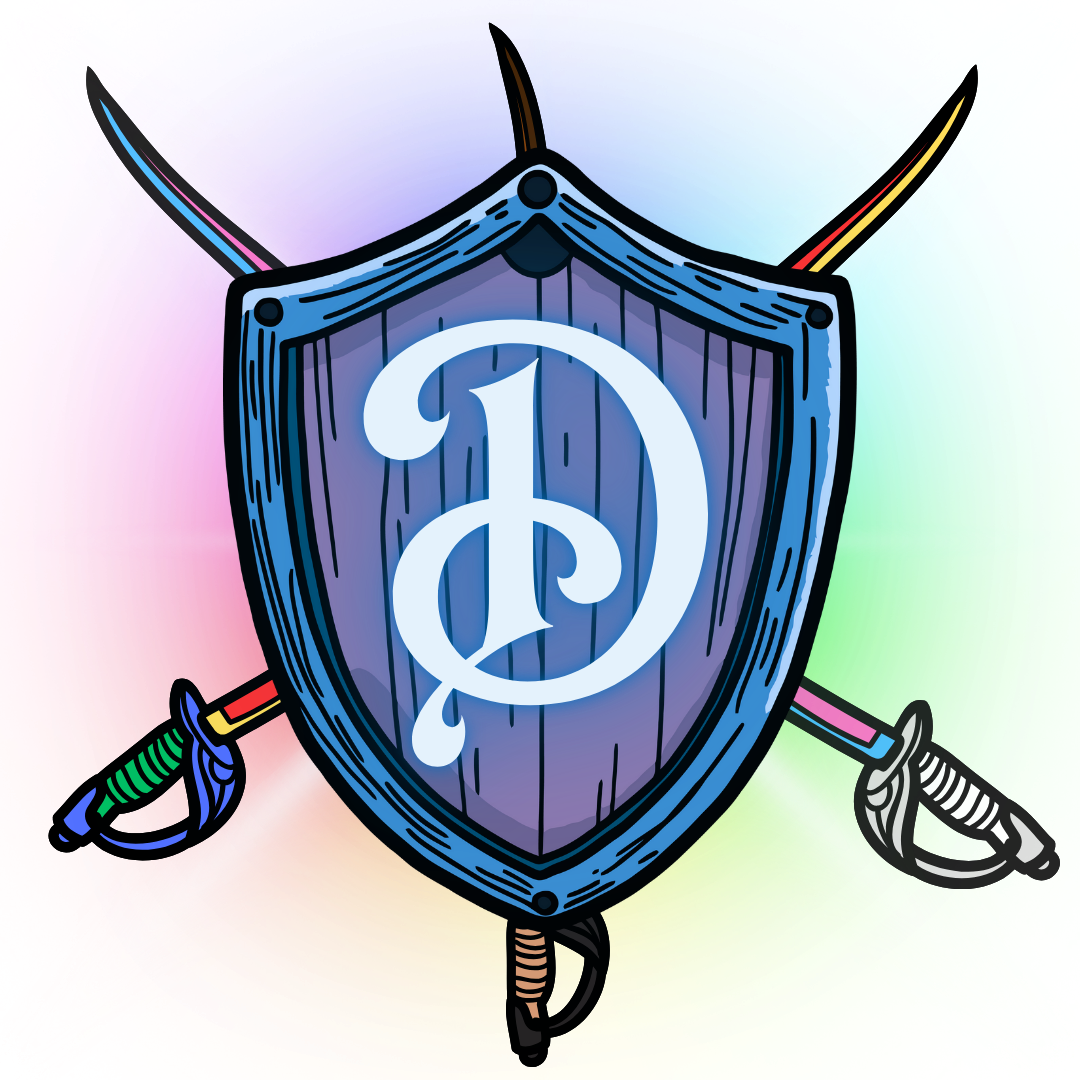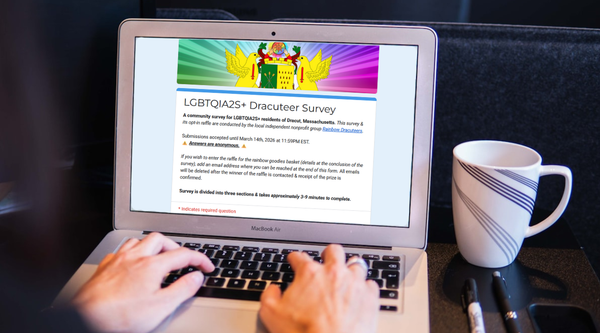A Toast🍞 To 50 Years of Rocky Horror
I see you shiver with antici...
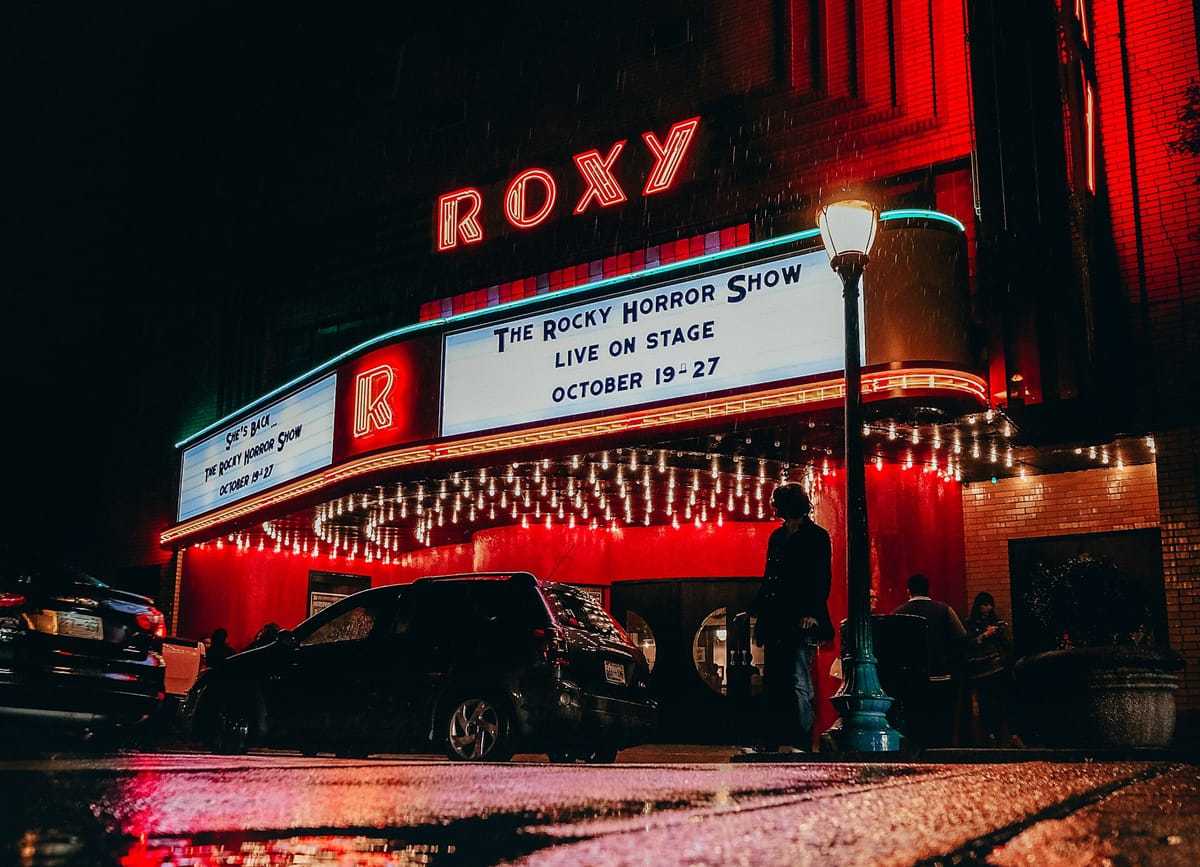
I would like–if I may–to take you on a strange journey.
As a child I loved Godzilla movies. I still do, but my young Power Rangers-addled mind was particularly interested in anything that involved Japanese stunt men in bespoke rubber suits crashing into scale models of cities and shooting beams at each other.
While the original Godzilla film is often lauded as a classic (deservedly so) and other films in the series can be considered legitimately great films (Shin Godzilla and Godzilla Minus One are both incredible), most Godzilla films (and especially the ones I liked the most as a kid) are cheesy, cheap, formulaic, and frankly, largely forgettable. "B Movies" as they are often called.
But, also as a child, I first saw the long-running television show Mystery Science Theater 3000, or MST3K for short. If you are unfamiliar, it was a show that specialized in showing "B Movies" with a man and two puppets who would spend the entire movie "riffing" it. My father watched it somewhat regularly, and I usually found it weird and boring (except for the puppet sequences before and after commercial breaks which I loved), but when they had an episode where they riffed a Godzilla movie (either "vs. Megalon" or "vs. the Sea Monster", I can't remember which), suddenly the concept clicked for my tiny brain.
I didn't mind that they were making fun of the movie while it played, because I didn't watch Godzilla movies for the dialogue or story, and I also found the robots funny. Godzilla AND puppet comedy at the same time?! What's not to like?
Years later, as a young teenager, I would be talking to someone about my love of MST3K, and he would tell me about how that concept was originally inspired, in part, by an old movie musical from 1975: The Rocky Horror Picture Show.
I had no idea what he was talking about at the time, but I filed it away in my brain, and a few years after that, I finally got around to watching the film with a group of friends, most of whom also hadn't seen it before.
And I pretty much hated it.
Well, "hate" is probably too strong. I thought it was boring, not very funny, and very confusing. It was mostly being held together by Tim Curry and some really catchy songs.
It was then that I learned that, when it came out in 1975, The Rocky Horror Picture Show actually did very poorly. It wasn't until years later, when fans would put on and attend midnight showings of the film on a regular basis, that it would finally start seeing success.
But these midnight showings weren't typical movie screenings. No, the fans would bring props, dress in drag, play raunchy games, and of course, riff the movie. Loudly.
So, in a way, I had only really experienced one half of Rocky Horror.
Then I went to college, and after failing to land a role in an on-campus production of Pippin, I found out there were auditions for a Rocky Horror shadow-cast.
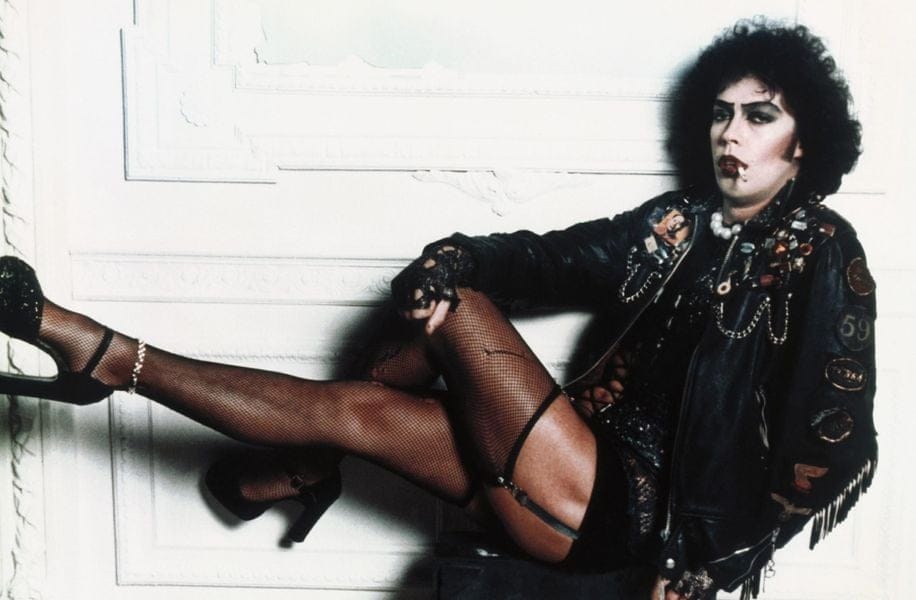
See, during these midnight screenings of Rocky Horror, there would also often be people in costume mimicking the action in the film happening behind them. While I wasn't fond of the movie, I did like some of the music. The flyer for auditions promised that everybody who auditioned would be cast, and I desperately needed something to do at that point—so I auditioned.
Also attending the audition was a fellow student named Emily. And unlike most of the people in attendance, Emily had gone to SEVERAL midnight showings of Rocky Horror. And she knew a riff (or "callback" as they're often called) for basically every scene, and shouted them out DURING THE AUDITIONS.
While this was absolutely distracting, the director encouraged it because it was going to happen during the live show x 100, so we'd better get used to it now. So while Emily didn't want to audition for any specific roles, she stayed for the entire audition to get us all used to the riffs and callbacks.
And my goodness, some of the things I heard out of this young queer woman's mouth!
MST3K was always relatively family-friendly and low-key. Rocky Horror, on the other hand, was definitely, explicitly not. Many Rocky Horror callbacks are deliberately vulgar, insulting, tasteless, and unapologetic. Sexist, racist, ableist, homophobic, transphobic. And Emily was saying these things, from memory, with her full chest and a smile on her face.
That year, I was cast as the Narrator/Criminologist (or Crimmie as he's affectionately known), which meant I was one of the few cast members who DIDN'T dress in drag. It also meant that I had to attend a lot of rehearsals.
At just about every rehearsal, Emily was there, shouting the callbacks from memory until we stopped breaking character to laugh. She didn't HAVE to be there, she just loved Rocky Horror that much, and she wanted to share that love with the rest of us. And it worked, because I, too, often found myself attending rehearsals I didn't have to go to so that I could learn the callbacks from Emily. After all, as the Crimmie, I was sitting behind a lectern for most of the performance, ready to pop out at a moment's notice to narrate something, so callbacks were the best way for me to pass the time.
Those first live performances were some of the most fun I ever had on a stage. It was like being inside a live, unrated episode of MST3K. Each performance sold out. Needless to say, I was thrilled that I didn't get cast in Pippin that year.
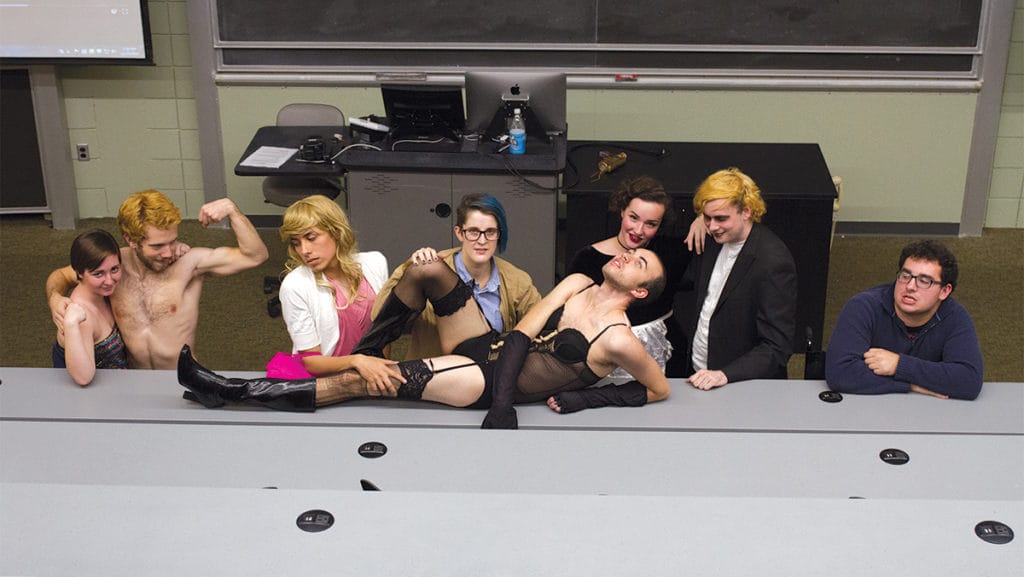
The next year, however, the college club that put the show on decided to just screen the movie without a shadow-cast. (In part because the president of the club at the time hated the show, but tolerated it as a fundraiser.) Additionally, the director from the previous year was no longer available. After I learned that, I told a friend of mine who was also involved with the club leadership that if they had trouble finding a director next year, I'd volunteer to do it.
Weeks later, I got an email asking if I'd actually be willing to do it. Honestly, I was caught off guard, and for reasons that I think should be obvious by now, I recommended they ask Emily first. After all, I only knew the callbacks thanks to her constant drilling, and she loved it more than anyone I knew. But, then I found out she was transferring schools, so the task fell on my shoulders.
Suddenly, this movie I originally didn't even like much was a massive part of my life for two years.
I started off by finding a transcript of the movie and writing down all of the callbacks I remembered from Emily. In my search, I also found out about a bunch of other callbacks by combing through other callback scripts from different Rocky Horror shows all over the world, and while not all of them landed, I did try out a lot of them during rehearsals just to keep the shadow-cast on their toes, and maybe see if any would stick.
Years after I graduated in 2009, I would find out that the college was still using a version of my original callback script. I recently had a chance to look at one such revision and I was actually relieved to see a lot of the more gratuitously edgy stuff didn't make the cut.
While I've never had the absolute pleasure of participating in a Rocky Horror show cast, I do adore the film and had an interactive screening with my friends back in high school—complete with a tarp-covered living room so we could use water pistols and throw around some toast & toilet paper! As a queer teen in the mid 00's, the horror-comedy-musical nonsense of this 70's B-movie felt deliciously transgressive and quickly became a cult classic favorite in my heart of hearts.
When Patrick & I were handfasted after dating for several years, our entire wedding party did a passionate rendition of the Time Warp that hopefully did right by the glory of Tim Curry. Even all these years later, RHPS remains a beloved gem in the rough for us. ~Kaye C.
Sadly, I do not believe that Ithaca College still does a Rocky Horror shadow-cast. Honestly, it was always kind of an albatross. It was originally put on by the theater school for the Halloween movie night, but one year one of the students in attendance complained about hazing. The theater school opted to stop doing it in light of the complaints, but the tradition was kept alive by a series of student groups until, I imagine, it just fell out of fashion. After all, it probably would have ended altogether in 2006 if I hadn't run into a friend on my last day of school and thought to ask about it. It's not hard for me to imagine a future generation of students feeling less enthusiastic about it in recent years.
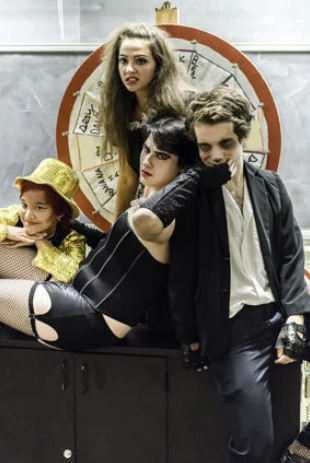
And to be clear, this is not yet another screed against "the woke mob". There are legitimate critiques to lobby at Richard O'Brien and his very, very strange musical. As I mentioned at the start, my first impression of the movie was "pretty good music, but absolute trash".
I don't want to celebrate 50 years of Rocky Horror Picture Show on Halloween just because it's a timeless classic that "should be" appreciated by generations to come. Rather, I want to celebrate RHPS because for the bulk of those 50 years—and still to this day—Rocky Horror has served as a space of community for all kinds of people who feel they don't quite fit into the traditional mores of society.
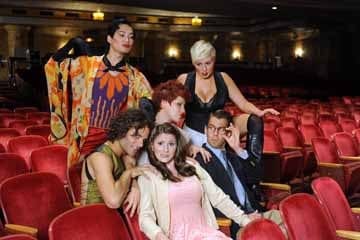
During my two years of directing a Rocky Horror shadow-cast as a hetero cis man, I was fully immersed in queer culture for the first time, and that, I think, was when I finally really understood Rocky Horror as something more than a cheesy movie that's fun to make fun of and sing along with. I had been in theater spaces before, and they're always at least a little queer, but most queer folks tend not to really draw attention to their identities outside of cast parties.
But at Rocky Horror, I saw so many young LGBTQ+ and queer-friendly college kids find community with one another. Through the unfiltered and often improvised humor of the shadow performance and the callbacks, people who maybe spent a lot of their lives up until that point avoiding the topic of queerness altogether were part of a performance that was anything but subtle about its queer themes. Problematic? Yes, absolutely. Unapologetic? Also yes, and I think that was what made it work in a way that maybe it just doesn't anymore.
In prior decades, these sorts of spaces were not only necessary but even harder to find compared to today. The idea of queerness being even remotely normalized was so laughable, it's basically the only joke in the entire movie, and it was a joke the queer audience was largely in on. They shouted slurs that were hurled at them every day of their lives as a way to find power and humor in it and direct it towards fictional characters in a cheesy movie. They dressed however they wanted to dress, and if anyone thought it was weird, they would just say they were going to Rocky Horror, and suddenly it was okay.
But these days, normalization is not a joke. Not only is it an achievable goal, it is a worthwhile goal. Queer youth aren't looking for spaces to hide; they're looking for spaces to exist authentically and safely. Rocky Horror is absolutely not an authentic, complex representation of queerness, even as it's served as a central hub for queer communities for generations. These days, at least in careless hands, it could do less to normalize queerness and instead serve as a platform to normalize the collective yelling of dated slurs and tasteless jokes at caricatures of queer people who are presented as aliens and monsters.
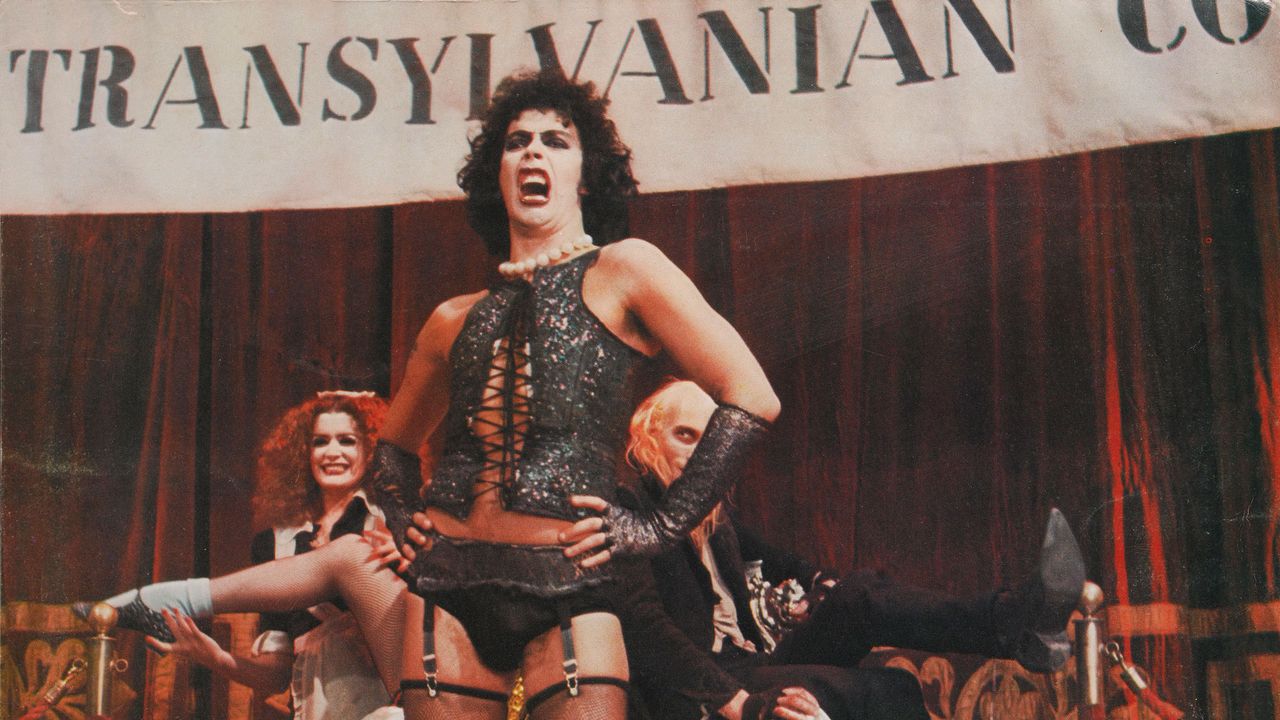
I do think there's a place for Rocky Horror in queer culture. I think for my generation and older, it serves as a nostalgic reminder of how the LGBTQIA+ community and their allies got through decades of intense stigmatization and came out stronger. But I don't know what place, if any, it might have for the generations that will come after.
But my hope is that, if it's remembered for anything, it's not remembered for the people who made it (as lovely as many of them are/were), nor for the movie itself or the stage musical, and not even for the film screenings and callbacks.
Most of all, I want it to be remembered for the people and communities it brought together.
And also, Tim Curry. God bless that 20th century fox, and God save the queens.
...pation.
